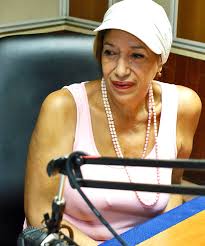12.19.2 Maureen Iznaga

Maureen de los Ángeles Iznaga y Ordoñez, a prominent Cuban singer, was born in the Cuban province of Cienfuegos. She grew up under the artistic influence of her maternal grandmother, who ran the Lico Jiménez Music Academy in her hometown, where she received lessons in choral singing, music theory, and piano from a young age. During her primary school years, she began participating in various artistic activities, earning several awards and distinctions.
In 1968, he graduated as an agricultural planning and accounting technician and began his professional career at the National Institute of Agrarian Reform, where he quickly joined the amateur artists’ movement of the Cuban Workers’ Central of the Ministry of Culture. He remained there until 1980, winning two national trova awards and nine national amateur festival awards.
Maureen Iznaga graduated in 1979 with a degree in Economics from the University of Havana. At that time, she was working as Head of the Finance Department for the television program Todo el mundo canta, where she decided to appear in 1980, winning Second Prize in the Grand Annual. This award, along with her excellent track record as an amateur artist, earned her a place in 1981 on a professional artistic career, awarded by the Cuban Workers’ Union and the Ministry of Culture. She studied singing with Mariana de Gonitch and Marcelino del Llano; and in 1984, she completed her singing studies at the Ignacio Cervantes Professional Development Center.
Her melodious and melodious voice has toured the country on successful national tours. The song “Alfonsina” was her first major hit as a performer. Her performances have taken place in venues ranging from the most important theaters to the smallest communities, as well as in penitentiary centers, healthcare and educational institutions, military units, and more. She has actively participated in various Cuban cultural events, book fairs, and Boleros de Oro, Son, and Cha-Cha-Cha festivals.
Considered by many to be a distinguished singer for her unique voice and her authentic approach to performing, Maureen Iznaga has presented works in various editions of the Adolfo Guzmán Cuban Popular Music Competition, where she won awards in 1983, 1984, and 1986. She has also appeared as a guest artist on several occasions, as well as in the Juan Arrondo and Chany Chelasy competitions.
Due to her undeniable quality as a performer, she has been invited to participate as a judge at important musical events, such as the OTI Competition in 2000 and the Mariana de Gonicht Singing Competition, among other important musical cultural events in Cuba.
Her international tours have allowed her to take her art to countries such as Mexico, Angola, and Spain; in the latter, she performed in the show “Antología del Bolero,” where she shared the stage with international figures such as Diango, Moncho, Armando Manzanero, Mercedes Pradera, and the Trio Los Panchos, among others.
On one of her numerous national tours, what was undoubtedly one of the most relevant moments of her artistic career took place when she participated in the musical show “Tres tiempos de mujer” (Three Times of a Woman), where, under the direction of Raúl de la Rosa, she had the immense privilege of sharing the stage with the first Cuban vedette, Rosa Fornés.
Maureen Iznaga, with a genuine Cuban flair, is already an established performer with a repertoire based on traditional Cuban music with notable influences from Latin American music, masterfully encompassing the Feeling, Ballad, Romantic Song, and Bolero.
She has also ventured into theater acting with the Buscón Group, under the direction of José Antonio Rodríguez. Her image and voice have also been featured in Cuban cinema in two films dedicated to the work of César Portillo de la Luz: the medium-length fiction film, En parte de mi alma, and the documentary, Si poder mostrarte.
The prestigious Casa del Bolero Dos Gardenias has included Maureen in its artistic catalog since 1995, and her musical career has been widely publicized on the country’s radio and television media. La Iznaga became known as a composer in 2002, and some of her songs, such as Fue mentira (It Was a Lie) and Lo meritesco (I Deserve It), have topped the charts in Cuba.








